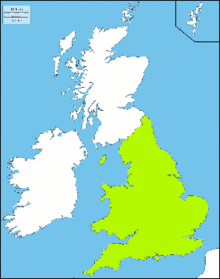Brytho-Hellenic
| Brytho-Hellenic | |
|---|---|
| Elynig (to kaen) | |
| Pronunciation | [[Help:IPA|ɛ'lənig 'tɔ 'kai̯n]] |
| Created by | – |
| Native to | Elas to Kaen |
| Native speakers | 52 millions (2012) |
Indo-European
| |
| Official status | |
Official language in | Elas to Kaen |
| Language codes | |
| ISO 639-1 | el |
| ISO 639-2 | ely |
| ISO 639-3 | ely |
New Greece or "Elas to Kaen" | |
General information
Brytho-Hellenic, Brythohellenic or simply Neohellenic (the native name is Elynig) is a language that is spoken nowadays in a different timeline in a country that corresponds almost exactly to our England. In that timeline the Persians have won the wars against Greece and the Greeks have been forced to emigrate and to flee. Firstly the Greeks find protection in Magna Graecia, but, as the Persians conquer those territories, they shift to Northern Italy, where the Romans withstand the Persian troops. In 389 b.C. Rome is destroyed and both Romans and Greeks flee to Carthage, enemy of the Persian empire. Together they try to attack the Persian fleet, but they are defeated again. In the last days of 382 b.C. an imposing expedition sails away from a harbour on the coast of New Carthage - our Cartagena in Spain. Its mission is to find new territories where they can live in peace and prosperity, far from the Persian threat. In 381 b.C. Conon the Athenian and his Greeks reach our Scilly Islands: they have chosen to sail northward, because they had heard about legends that spoke about a fertile and grassy island in the North. It is the beginning of the New Greece or Elas to Kaen (IPA ['ɛlas 'tɔ 'kai̯n]).
Phonology
Alphabet
After the defeat against the Persians almost the entire Greek people fled towards Roman territory: Rome triplicated its population and was greekized. During their living together Greeks and Romans used mainly the Greek language to communicate, whereas the Latin language became a secondary and socially lower language, spoken mainly by common people. Nevertheless - almost incomprehensibly - the Greeks adopted the Latin alphabet, maybe trying to be understood even by the lower social classes. As we are talking about the modern language, we don't consider the first versions of the alphabet that were used in ancient times. The alphabet of Brythohellenic contains 24 letters:
| Letters | Pronunciation | Further informations |
|---|---|---|
| a | [a] | - |
| b | [b] | - |
| d | [d] | - |
| dh | [ð] | like the English 'th' in the word that |
| e | [ɛ] / [e] | it can pronounced either open or closed, but it doesn't affect the meaning |
| f | [f] | - |
| g | [g] | it is always pronunced as in the English word "get" |
| gh | [h] | it was pronounced as [x], but nowadays it is pronounced the same as 'h' |
| h | [h] | - |
| i | [i] / [j] | often it forms a diphthong when precedes or follows another vowel |
| k | [k] | - |
| l | [l] | - |
| m | [m] | - |
| n | [n] | - |
| o | [ɔ] / [o] | it can be either open or closed, but it doesn't affect the meaning |
| p | [p] | - |
| r | [r] | trilled just as in Italian |
| s | [s] | always voiceless |
| t | [t] | - |
| th | [θ] | - |
| u | [u] | - |
| v | [v] | - |
| w | [w] | - |
| y | [i] / [ǝ] / [j] | in monosyllabic words it is read as [i], in polysyllabic words it is read [i] if in the last syllable, otherwise [ǝ]; often it is read [j] if precedes or follows another vowel |
A circumflex accent over the y indicates that it is read as [i] even if it is in a position where it would be read as [ǝ], ex.: ŷthias, "fish (pl.)" (IPA ['iθjas]).
Consonantal phonemes
Brythohellenic has the following consonantic phonemes:
| Phonemes | Bilabial | Labiodental | Dental | Alveolar | Postalveolar | Palatal | Velar | Glottal |
|---|---|---|---|---|---|---|---|---|
| Stop | p b | t d | k g | |||||
| Affricate | ||||||||
| Nasal | m | (ɱ) | n | (ŋ) | ||||
| Fricative | f v | θ ð | s | (x) | h | |||
| Approximant | r | j | w | |||||
| Lateral approximant | l |
In the South-Western area (our Cornwall) the digraph gh is pronounced as [x].
Vocalic phonemes
Brythohellenic has the following vowel system:
| Phonemes | ||
|---|---|---|
| Opening | Front | Back |
| Closed | i | u |
| Mid-closed | e | o |
| Mid-open | ɛ | ɔ |
| Open | a | |
